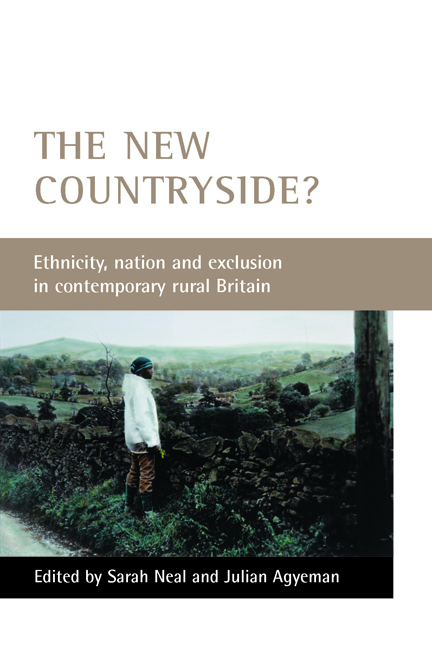four - Remaking English ruralities: processes of belonging and becoming, continuity and change in racialised spaces
Published online by Cambridge University Press: 18 January 2022
Summary
Britain prides itself on being a multicultural society, yet out here in the countryside, that's far from the truth. I believe that being British means more than owning a British passport. We need to feel confident that we can explore every corner of it. Until then, we’ll continue to feel like strangers in our own land.
(Julian Agyeman's closing words from Countryfile, BBC 2, 1 August 1992)
Introduction
Local elections in England in May 2002 saw the British National Party (BNP) achieve its best electoral success when three BNP candidates became councillors in Worsthorne, a small, affluent Pennine village. The Independent commented on how Worsthorne ‘with its village green, Gothic churches, two pubs and clematis-creepered gritstone cottages seems an unlikely outpost of racism’ (3 July 2002). However, during the last decade it has becoming increasingly clear that the success of the far right in the rural idyll that the Independent describes is not as ‘unlikely’ as is imagined. While there has been a long tradition of dis-associating the pastoral landscape from issues of ethnicity, race and racism, the growing body of empirical and theoretical work evidences the extent to which the English countryside, and the idea of the English countryside, occupies a particular and racially coded place in Britain's ‘national story’. The BNP electoral success in the north of England occurred in the same year in which there were widespread local protests against David Blunkett's (the then Home Secretary’s) now-abandoned proposals to create semi/rural-based asylum seeker and refugee centres (Younge, 2002). Although using a more coded discourse of race than the BNP – allegations of racism were mostly denied by the inhabitants of the villages of Newton and Bingham in rural Nottinghamshire (Guardian, 24 June 2002) – the residents’ response to the Home Office's proposals to turn a disused RAF base into a refugee and asylum-seeker detention centre has been one in which the issue of desirable and legitimate presences in the rural landscape has been at the fore. That notions of race shape this desirability and legitimacy is evidenced in Gary Younge's coverage of the protests.
- Type
- Chapter
- Information
- The New Countryside?Ethnicity, Nation and Exclusion in Contemporary Rural Britain, pp. 99 - 126Publisher: Bristol University PressPrint publication year: 2006

